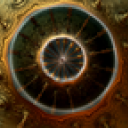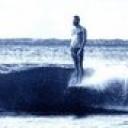Jonathon Nimerfroh's cover pic today


Check his website


Also I think the marble effect is due to stirred up slit/sand or similar, not the extremely cold near frozen water.


Don't you guys read some posted threads........? Or just not that silly feck Welly's haha
I put this up on the 27.2.15. http://www.swellnet.com/forums/wax/248251
A good mate from NE coast Vermont knows Johnathon very well and sent me his link.


Yeah I saw that thread last week Welly, I wasn't gonna comment and bring attention (as it was appearing everywhere all over the web) till Stu ran the WOTD, then all these other ones popped up today :p


See: http://www.nytimes.com/2015/02/28/science/nantucket-frozen-waves.html?_r=0
"How cold has it been on Nantucket? Chilly enough to freeze waves.
Last Friday, Jonathan Nimerfroh, a photographer, arrived on the beach and saw an unusual sight: slow-moving waves of slush.
“I just noticed a really bizarre horizon,” said Mr. Nimerfroh, who is also a surfer. “The snow was up to my knees, getting to the water. I saw these crazy half-frozen waves. Usually on a summer day you can hear the waves crashing, but it was absolutely silent. It was like I had earplugs in my ears.”
It is not uncommon for the harbor to freeze, but even a fisherman he spoke with later said he had never seen anything quite like it.
Normally, water freezes at 32 degrees Fahrenheit. But salt in the ocean lowers the freezing temperature — basically by getting in the way of the water molecules — to about 28.4 degrees.
The movement of the waves seems to have broken up ice crystals before they could grow into a sheet covering that shallow stretch of the Atlantic Ocean. The result was an ocean with the consistency of a 7-Eleven Slurpee.
Helen Fricker, a glaciologist at the Scripps Institution of Oceanography in La Jolla, Calif., who studies the dynamics of ice flows in Antarctica, said the images were beautiful, but a full scientific explanation was outside her expertise.
“Basically, it’s very cold,” she said. “You’ve got waves. I imagine this does happen all around the edges of the Arctic Ocean. I can’t really say more than that. It’s the ocean freezing.”
That Friday was an uncommonly cold day on Nantucket, in Massachusetts, with a low of 10 degrees, according to the National Weather Service. If temperature were the only factor, frozen waves might be more common.
“I have never seen frozen waves like this,” said Erin Pettit, a glaciologist at the University of Alaska, Fairbanks, adding that waves in Alaska tend to break up sea ice. “Cold, but calm water is what normally freezes easiest.”
On the website Reddit, people wondered if it might be possible to surf the waves, which Mr. Nimerfroh estimated to be about two to three feet tall. (Possibly not, because ice is less dense than water and a surfer might just sink.) The waves might hurt more too, just as an ice ball hits with more force than a water balloon.
Mr. Nimerfroh returned to the beach on Saturday, which was even colder by a few degrees. But by then, the water had frozen into an ice sheet. “Nothing was moving,” he said. “There were no waves anymore.”


Thanks for that Chill60.


Specifics, I need to know what temperature that water is to give it the marble effect - the water looks like stone. Where is it?